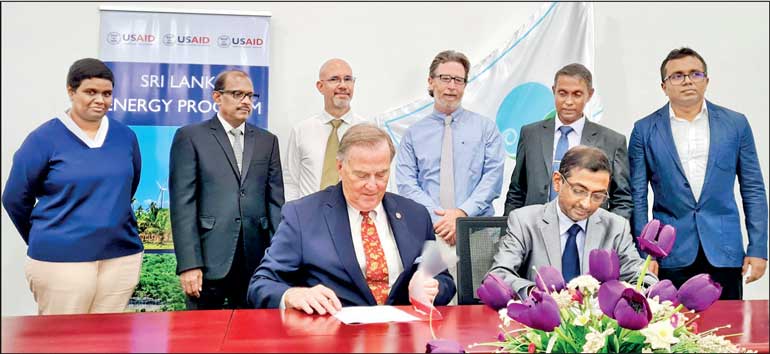Friday Feb 20, 2026
Friday Feb 20, 2026
Wednesday, 4 October 2023 00:30 - - {{hitsCtrl.values.hits}}

In a joint initiative aimed at fostering energy efficiency among businesses and simplifying energy usage reporting, the United States Agency for International Development (USAID) has partnered with the Sri Lanka Sustainable Energy Authority (SLSEA) to unveil a ground-breaking tool
USAID, in collaboration with SLSEA through its Sri Lanka Energy Program, introduced the National Energy Benchmarking Portal (NEBP). This innovative platform is designed to assist businesses in curbing electricity consumption by promoting efficient practices and conservation methods, thereby addressing the challenges posed by escalating energy costs. The launch of NEBP marks a significant step toward a more sustainable and energy-efficient future for businesses in Sri Lanka.
The National Energy Benchmarking Portal (NEBP) is the result of two years of collaboration between USAID, SLSEA and select private organisations. The portal is a digital solution to disseminate energy consumption data and will be managed by SLSEA as a central repository for energy consumption data from all industrial, commercial, and Government facilities in Sri Lanka, starting with supermarkets and the financial sector.
Organisations can submit their energy consumption and other data required for benchmarking through the portal, which contains data from a company's own facilities and allows a company to compare its performance against the SLSEA benchmarks. The portal will improve the efficiency and accuracy of data entry and analysis for nearly one million consumer accounts, allowing for the identification and comparison of consumption patterns in real time.
USAID/Sri Lanka Director of Economic Growth Christopher Powers called the new portal a critical tool to support energy efficiency initiatives. “USAID, through the Sri Lanka Energy Program, aims to introduce clean energy and reduce excess energy use across Sri Lanka. This portal is a critical tool that will support USAID investments to power an energy sector that is secure, efficient and sustainable,” he said.
“We initiated a mandatory energy efficiency and conservation (EE&C) program many years after voluntary programs failed to impress the majority of Sri Lankan enterprises,” said SLSEA Chairman Ranjith Sepala. “Due to their low-cost energy supply, businesses rarely make energy efficiency and conservation investments despite their financial appeal. Now, with realistic energy prices, is the ideal time to engage businesses in EE&C, and we appreciate USAID's assistance in digitising our process.”